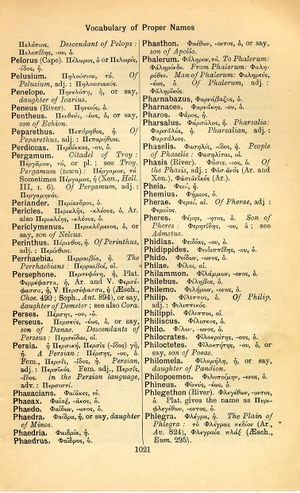Periander: Difference between revisions
Ἔοικα γοῦν τούτου γε σμικρῷ τινι αὐτῷ τούτῳ σοφώτερος εἶναι, ὅτι ἃ μὴ οἶδα οὐδὲ οἴομαι εἰδέναι → I seem, then, in just this little thing to be wiser than this man at any rate, that what I do not know I do not think I know either
m (Text replacement - "}}]]" to "}}]]") |
m (Text replacement - "link={{" to "link={{") |
||
| Line 1: | Line 1: | ||
{{WoodhouseENELnames | {{WoodhouseENELnames | ||
|Text=[[File:woodhouse_1021.jpg|thumb | |Text=[[File:woodhouse_1021.jpg|thumb | ||
|link= | |link={{filepath:woodhouse_1021.jpg}}]]Περίανδρος, ὁ. | ||
}} | }} | ||
{{Lewis | {{Lewis | ||
Revision as of 10:09, 15 August 2017
English > Greek (Woodhouse)
Περίανδρος, ὁ.
Latin > English (Lewis & Short)
Pĕrĭander: dri, m., = Περίανδρος,
I son of Cypselus, a king of Corinth, and one of the seven wise men of Greece, Gell. 16, 19, 4; Aus. Lud. Sept. Sapient. fin.; Hyg. Fab. 221.
Latin > French (Gaffiot 2016)
Pĕrĭandĕr (-drus Hyg. Fab. 194 ), drī, m. (Περίανδρος), Périandre [roi de Corinthe, l’un des Sept Sages de la Grèce] : Gell. 16, 19, 4.
Latin > German (Georges)
Periander u. Periandrus, drī, m. (Περίανδρος), Tyrann von Korinth, einer der sieben Weisen, Form -der, Gell. 16, 19, 4. Hyg. fab. 221: Form -drus, Hyg. fab. 194 u. Auct. sent. bei Hyg. fab. 221. Sidon. carm. 23, 103.

